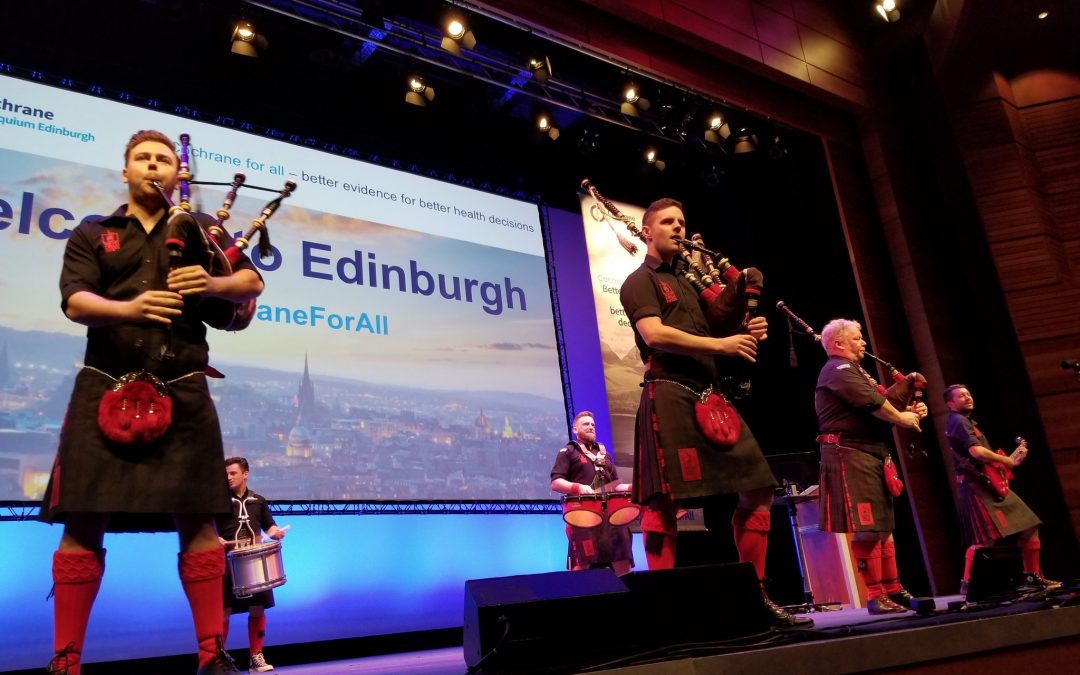For updates, follow Casey’s tweets on the #CochraneForAll hashtag – tweets by her and tweets tagging her.
Casey will be a speaker at #SPM2018 on Oct 17, in a session with Ivan Handler of the Insightamation blog – “Thoughts and provocations on the dramatic changes in human culture we are experiencing based on the ever increasing tidal wave of digital data we are creating and experiencing.” More information on #SPM2018 at bottom.
Being friends with @MightyCasey Quinlan (one of our society’s earliest members) is an adventure. She’s at an important event, using patient travel funds she applied for from us, and this morning she started sending updates to some of us via chat … updates that just screamed to become a blog post. Stay tuned. (The photo above, which she took Sunday, is of the group that performed today – The Red Hot Chili Pipers, she tweeted – “and they’re GOOD!”) (And she’s podcasting with BeyondTheRoom!)
Greetings from Edinburgh + the 25th annual Cochrane Colloquium (I know it’s BLOODY early in US!) – attending a sesh at 11am BST | 6am ET | 3am PT, Beyond privacy: the emerging ethics of data reuse – “This workshop will follow on from the keynote talk ‘Big Data, Little Data, or No Data? Systematic Reviews in an Age of Open Data’.”
The workshop will explore the meaning of “Informed Consent” and its implication for reusing human subject open data from and for biomedical research. Patients and volunteers donate their data in the context of research designs that are vetted and approved by ethics committees. When research data are released in open access – especially observational data – these can be reused to explore a number of new hypotheses. As we know from previous studies, biomedical data can be reused in many unpredictable ways – new research communities are formed around pre-existing data, and the free availability of research data increases innovation, knowledge integration, and reproducibility.
At the same time, openness of data could also expose donors to surveillance and discriminatory research practices that not only have ethical implications, but also were never agreed upon by the donors at the moment of data collection. In this workshop, cases of both successful and controversial data reuse practices will be presented and discusses.
We further discuss: Can and should we – and if yes how – filter the kinds of hypotheses that can be tested on a human subject dataset? Can and should we – and if yes how – permanently include ethical concerns in the provenance records of human subject datasets? How can we keep data donors actively “informed” about unpredictable reuses of research data?”
Some tweets:
Nirvana, #datascience style #CochraneForAll #BeyondTheRoom pic.twitter.com/WwZ7JIlLvS
— Mighty Casey Quinlan (@MightyCasey) September 16, 2018
Findable
Accessible
Interoperable <<< !!!! #interop
Reusable
FAIR Guiding Principles for scientific #data management #cyberwoke #datascience #CochraneForAll #BeyondTheRoom
HT @SciTechProf @IrenePasquetto pic.twitter.com/WAgeAhAmu8— Mighty Casey Quinlan (@MightyCasey) September 16, 2018
#PatientsIncluded #cyberwoke #OpenData #openscience #CochraneForAll #BeyondTheRoom HT @IrenePasquetto pic.twitter.com/2zBMeUYANj
— Mighty Casey Quinlan (@MightyCasey) September 16, 2018
Speaker Irene Pasquetto from UCLA is interested in what I told her about FB data jacking (broad sketch). If anyone’s awake to read this by 11am/6am/3am (oy) and has questions they’d like me to ask her, fire away.
@BraveBosom Andrea Downing replied: “Great topic. My question would be: what are her thoughts pros and cons of the Civic Trust model?”
Casey replied: Will ask about this when I see her – will mos def hunt her down, we’re here ’til Tuesday. BTW take a look at my Twitter feed from this morning (3am PT onward, Sept 16) for Christine Borgman @SciTechProf, Irene’s senior colleague at UCLA and partner on much research, slides on data science. It was SUPERB. I have slide deck. [Editor: she’s the author of Big Data, Little Data, No Data: Scholarship in the Networked World.]
To be continued, we hope.







Recent Comments